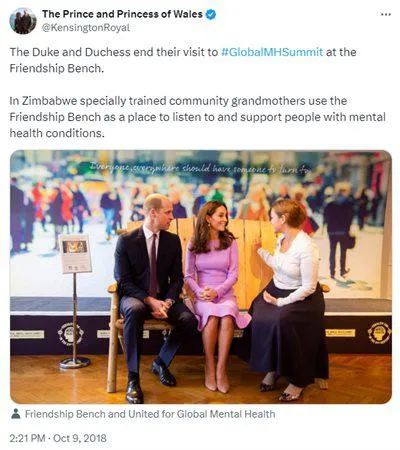“The Friendship Bench has brought mental health out of the shadows, showing that people in different countries want to access mental health care , and that lay workers can learn to deliver simple yet effective non-stigmatising evidence-based therapies which can change lives.”
Professor Melanie Abas, psychiatric epidemiologist, Professor of Global Mental Health at the IoPPN and Director of King’s Global Health Institute
04 June 2024
The burden of mental illness is felt profoundly in communities who have less access to mental health support. In Zimbabwe, there are only 18 psychiatrists, six clinical psychologists, and 917 psychiatric nurses for a population of 17 million as of April 2024. The country records consistently high rates of suicide (23.6 per 100,000), exceeding Sub-Saharan averages, while mental health receives just 0.42% of the total healthcare budget.
To alleviate the impact of mental illness on the Zimbabwean population, the Friendship Bench project was created to provide a community-based approach to mental health care, providing safe spaces and a sense of belonging outside of primary healthcare settings.
Using over a decade of research on the delivery of mental health including King’s research, the Friendship Bench was founded by Professor Dixon Chibanda at the London School of Hygiene & Tropical Medicine (LSHTM). The Friendship Bench clinical team trains lay community health workers to deliver a basic Cognitive Behavioural Intervention with an emphasis on Problem Solving Therapy, activity scheduling and peer-led group support.
The therapy is delivered outdoors, in the grounds of government primary health care clinics. Community health workers, who are mainly grandmothers, sit with their clients on wooden benches in discreet, safe community spaces, delivering up to six one-to-one counselling sessions. This is provided to people with mild to moderate mental health disorders such as anxiety and depression, known locally as ‘kufungisisa,’ which translates to “thinking too much.” Referral pathways are also provided for cases in which a client is considered to have a higher level of need.
Working with communities to improve mental health outcomes
Professor Melanie Amna Abas, psychiatric epidemiologist and Professor of Global Mental Health at the IoPPN, has researched culturally appropriate measurement and treatment of depression in Zimbabwe and its social origins extensively. In a randomised controlled trial conducted by the University of Zimbabwe, IoPPN, and London School of Hygiene and Tropical Medicine in 2016, brief psychological treatment delivered by Zimbabwean community health workers on Friendship Benches dramatically improved mental health symptoms.
The trial, supported by the Government of Canada through Grand Challenges Canada and published in JAMA, found people with depression or anxiety symptoms who received problem-solving therapy through the Friendship Bench Programme were more than three times less likely to have symptoms of depression after six months, compared to patients who received standard care (14 per cent of participants in Friendship Bench group depressed at follow-up compared to 50 per cent control participants). They were also four times less likely to present anxiety symptoms and five times less likely to have suicidal thoughts than the control group after follow-up.
As co-author of the study, Professor Abas said at the time that Friendship Bench was “set to become the largest mental health programme for depression in any low-income African country, being feasible to scale-up, low cost and culturally acceptable.”
“In 2023 we reached a major milestone by having Friendship Bench in all 10 provinces of Zimbabwe. “Moving forward, our theme at Friendship Bench is continuing to strengthen and expand our presence in these places by working with communities to provide localised, trusted support.”
Professor Dixon Chibanda, Professor of Psychiatry University of Zimabbwe, Friendship Bench Director, and Director of the African Mental Health Researtch Initiative
Using Friendship Bench to tackle co-morbidities
Most recently, researchers at the Centre for Global Mental Health, a collaboration between the IoPPN and LSHTM, conducted a study analysing the impact of Friendship Bench on HIV disease control, in people living with HIV and co-morbid common mental disorders. The study in Zimbabwe was the first of its kind to assess whether the community-based therapy could improve outcomes for those managing a long-term illness alongside depression or anxiety. These mental conditions are among the most common co-morbidities recorded for people living with HIV, and lead to poor adherence to antiretroviral therapy (ART). ART is essential for decreasing the level of HIV virus in the body, and poor adherence caused by depression is a key reason for poor viral control and progression to AIDS in people living with HIV.
This study recruited 700 participants aged 18 and over across eight HIV care clinics in Harare. Patients at six of the clinics received therapy through the Friendship Bench programme, while those at the remaining two clinics received usual care. Blood tests to measure viral load and mental health assessments were taken at the start of the study and followed-up after six months of treatment.
Published in PLOS Global Public Health in January 2024, the study found people living with HIV and common mental disorders who received the Friendship Bench were three times more likely to maintain HIV viral suppression, compared to people who did not receive the Friendship Bench. This important finding shows how improving mental health in countries like Zimbabwe with a high HIV burden is a route to accelerating progress towards ending the AIDS epidemic.
Expanding the reach of Friendship Bench
The Friendship Bench programme has now been running for over 10 years in Zimbabwe, to marked success. It has been successfully scaled up to all 10 provinces of the country, covering a population of approximately 16 million. In 2023, over 220,000 people received therapy from over 2000 community health workers across the country, and Friendship Benches are now also present in six countries around the world including the US, Vietnam, Malawi, Kenya, Zanzibar and Jordan.
Professor Chibanda, Professor Abas, and other researchers are also exploring a pilot Friendship Bench in London, and testing an enhanced form of the Friendship Bench called TENDAI for people living with depression and poorly controlled HIV.

The collaborators behind Friendship Bench are looking to replicate the findings of the HIV study with a larger cohort and follow patients over a longer period of time. There are also ongoing studies to assess whether the project can support people living with common health disorders alongside other chronic illnesses such as diabetes or hypertension.
The ambition of the project is for a Friendship Bench to be within walking distance for all. Last year, the project, along with the Zimbabwean Ministry of Health and Child Care, began the journey towards full integration of Friendship Bench in existing health services at provincial, district, community and village health care level in Zimbabwe.
The project has also partnered with the government and the World Health Organization to utilise the Friendship Bench In A Box digital tool-kit, which launched in 2023. This is a DIY digital toolkit that collates lessons from over 10 years of Friendship Bench to provide a step-by-step process on how to introduce Friendship Bench in a new setting, or how to maintain Friendship Bench in an area where it has already been introduced. Moving forward, this will be the blueprint for training all new delivering agents, to work towards the project’s goal of bringing a Friendship Bench within walking distance for everyone.
The Friendship Bench is grateful to its generous funders, the full list of which can be found in the latest annual report.


